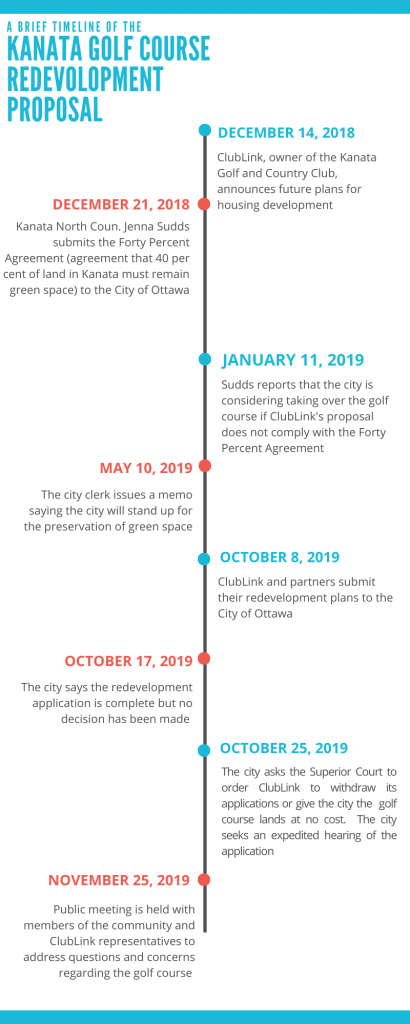For Kanata Lakes residents there has been one consistent concern for the last year: the threat that a 70-hectare golf course at the heart of their community will be turned into a mix of houses and apartment buildings.
Last December, ClubLink, who owns the Kanata Golf Course, said it was looking at working with Minto Communities and Richcraft Homes to replace the golf course with housing. In October they filed an official application to the city.
Haleigh Johns grew up in Kanata Lakes, enjoying the golf course in her backyard.
“My family is impacted by ClubLink selling the course because it would greatly change the lifestyle in Kanata that we’ve enjoyed for over 20 years,” she said.
“The greenspace provided by the golf course allows residents of Kanata to toboggan, ski, and snowshoe in the winter in a way that isn’t possible without this greenspace. Also, (our) property value would decrease if we no longer had a property backing on the course.”
Kanata North Coun. Jenna Sudds understands community concerns.
“People have made critical life decisions in purchasing a home in this community,” she said. “People who aspire to be around nature and (the golf course) greenspace have either moved in the vicinity or made use of this space on a regular basis.”
Sudds has been the public face of the fight against the golf course. She has met with residents in her office, knocked on doors and held meetings.
In the last year, she has been the community’s No. 1 source on City Hall, where officials have been mulling their options to safeguard the greenspace.
Last month the city put the golf course application in front of the Ontario Superior Court to force ClubLink to withdraw its proposal or give up the land to the city.
“I realized … very quickly how harmful this proposal was for our community,” said Sudds. “So ever since I have been working to oppose that.”
The ‘Forty Percent Agreement’
Today, the 18-hole golf course anchors the neighbourhood.
“The Kanata Lakes community was designed around the golf course,” Sudds said. “This was part of the master vision for this part of the city and it was solidified via a legal agreement.”
In the 1980s, the original land developer, Campeau Corp. signed the “Forty Percent Agreement” with the City of Kanata, ensuring 40 per cent of the land in the Kanata Lakes area remains as greenspace. ClubLink’s plans would not comply with the agreement.
For Sudds, that means residents have a fight they can win.

Continued public outcry
In a public meeting with ClubLink on Nov. 25, community members were able to ask questions and voice their concerns. IClubLink’s proposal would see more than half of the golf course will be filled by residential units, while the rest would become roads, storm water ponds, smaller parks and open spaces.
Following the meeting, participants took to the Kanata Greenspace Protection Coalition Facebook community to express their frustrations. The group advocates for the conservation of greenspace in Kanata.
Kanata resident Joanna Huang expressed her “utter disappointment” following the meeting.
“Not only did the panel of so-called experts provide us with inadequate answers, but they also did not demonstrate that they recognize – never mind care about – essential characteristics of our community,” she said, in a Facebook message.
She went on to say that ClubLink’s ““absurd proposal” would bring more cars, disruptions and permanent damage to the existing community.
ClubLink’s proposed storm water ponds did not impress her either.
“No one wants to swim in storm water ponds! So the community is left with a measly portion of scattered greenspace,” Huang wrote.
Resident Neil Thomson said he’s concerned about the City of Ottawa’s future development plans.
“It’s unfortunate that the City of Ottawa is putting greenspace as a much lower priority to densification of new and existing neighborhoods.”
Thomson said that he believes this is the reason why the owner of the golf course thought the city would potentially approve redevelopment plans.
“I don’t agree with turning the City of Ottawa and it’s green heritage into a super dense ‘gray’ mega city of concrete,” he said.
“It degrades the quality of life.”
At the time of publication, ClubLink could not be reached for comment.
While the future of the land is still open, Sudds continues to fight for her community members.
“For me success is them revoking their application or walking away from it and the city taking on the ownership,” Sudds said. “Success is the greenspace saved.”
A version of this story was first published on the website cusjc.ca




